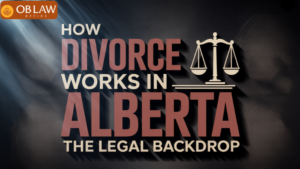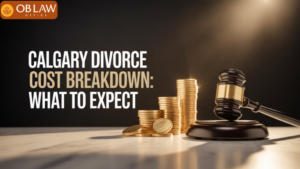When a marriage breaks down, couples in Alberta often face a difficult decision. Should they separate or proceed with a divorce? While both options involve living apart and resolving important issues like finances and parenting, they are legally different. Understanding the distinction between legal separation and divorce can help you make an informed decision that protects your rights and future.
At the OB Law Office, we support individuals and families through these important transitions. Here is everything you need to know about the differences between separation and divorce in Alberta.
What Is Legal Separation?

In Alberta, legal separation occurs when a married couple decides to live apart with the intention of ending their relationship. You do not need to go to court or file any official documents to be considered legally separated. Separation begins from the date one or both spouses decide to live separate lives.
While no formal legal process is required to be considered separated, it is highly recommended to create a separation agreement. This document outlines the terms under which the couple will live apart and usually includes:
- Parenting arrangements and decision-making responsibilities
- Child support and spousal support
- Division of assets and debts
- Use or ownership of the family home
A properly drafted separation agreement, prepared with help from a family lawyer, ensures that both parties are protected and that disputes are minimized. It can also be filed in court to make it legally binding.
What Is Divorce?

Divorce is a legal process that ends a marriage. In Alberta, divorces are governed by the federal Divorce Act. To apply for a divorce, at least one spouse must have lived in Alberta for at least one year before filing.
There are three legally accepted grounds for divorce:
- One-year separation
- Adultery
- Physical or mental cruelty
The most common ground for divorce is a one-year separation. After the court reviews your application and approves the terms related to parenting, support, and property, a Certificate of Divorce is issued. This officially ends the marriage and allows both individuals to remarry if they choose.
Key Differences Between Legal Separation and Divorce
The most important difference between separation and divorce is your marital status.
In a legal separation, you remain legally married. You cannot remarry unless you obtain a divorce. Some couples choose separation to maintain certain benefits like health insurance or pensions. Others prefer it for religious or personal reasons.
In a divorce, the marriage is officially and legally ended. Divorce not only settles financial and parenting matters but also removes the legal bond of marriage.
Another difference is the process. Legal separation does not require court involvement unless there is a dispute. Divorce always involves a legal application and court approval, even in uncontested cases.
When Is Legal Separation a Better Option?

Legal separation can be the right choice if you are not ready for divorce or want to take a step back while still being legally married. It may be a better option in situations where:
- You are considering reconciliation and need time apart
- You or your spouse have cultural or religious beliefs that discourage divorce
- You want to maintain benefits such as health insurance
- You want to establish rules for parenting and finances without ending the marriage
A separation agreement allows both parties to make legal decisions while still being married. This arrangement can provide emotional and financial stability while each spouse evaluates the next steps.
When Should You Consider Divorce?

Divorce may be the best solution when the marriage is irreparably broken and there is no intention to reconcile. Divorce allows each party to move on with full legal freedom. Consider divorce if:
- You are certain the marriage cannot be repaired
- You or your spouse want to remarry
- You want to permanently end all spousal obligations
- You prefer a complete legal and emotional separation
The divorce process includes important steps such as the division of property, child custody arrangements, and spousal support. It brings legal closure and clarity to all aspects of the relationship.
Which One Is Right for You?
Choosing between legal separation and divorce depends on your personal, emotional, and financial situation. Some couples begin with a separation and later move to divorce. Others may remain separated for many years without ever legally ending the marriage.
To make the right decision, it is essential to speak with a qualified family lawyer who understands Alberta law. A lawyer can help you understand your rights, draft a fair agreement, and avoid common legal pitfalls.
At the OB Law Office, we provide compassionate and strategic legal advice tailored to your situation. Whether you are thinking about separation or ready to file for divorce, we will guide you through each step and make sure your future is protected.
Final Thoughts
Legal separation and divorce may seem similar, but they carry very different legal consequences. Separation allows you to live apart while staying legally married. Divorce ends the marriage completely and gives both parties legal independence.
Before making any decisions, talk to a trusted legal professional. Whether you need help creating a separation agreement or filing for divorce, OB Law Office is here to support you with clarity, confidentiality, and care.
If you have questions or need guidance on family law matters in Alberta, contact the OB Law Office today to schedule a consultation.




